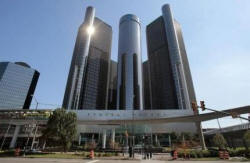|
 U.S.
union, GM reach tentative agreement on labor contract U.S.
union, GM reach tentative agreement on labor contract
 Send a link to a friend
Send a link to a friend
[October 26, 2015]
By Bernie Woodall
DETROIT (Reuters) - Negotiators for the
United Auto Workers and General Motors Co reached a tentative agreement
on undisclosed terms for a new four-year labor contract, averting a
threatened strike, the union said late on Sunday night.
|
|
 The proposed deal will now go to a council of several hundred UAW
leaders from GM's U.S. plants meeting on Wednesday, who are expected
to approve it. The contract then goes to a ratification vote of the
UAW's 52,700 workers at GM. The proposed deal will now go to a council of several hundred UAW
leaders from GM's U.S. plants meeting on Wednesday, who are expected
to approve it. The contract then goes to a ratification vote of the
UAW's 52,700 workers at GM.
Last week, the union's new contract with Fiat Chrysler Automobiles
NV was overwhelmingly ratified by worker vote.
"We believe that this agreement will present stable long-term
significant wage gains and job security commitments to UAW members
now and in the future," said UAW President Dennis Williams. "We look
forward to presenting the details of these gains to local union
leaders and the membership."
GM confirmed in a separate statement that it had reached a tentative
accord with UAW negotiators. "The new UAW-GM national agreement is
good for employees and the business," Cathy Clegg, head of North
American GM manufacturing and labor, said in the statement.

Clegg also said the contract will give GM the flexibility "for the
company to respond to the needs of the marketplace."
One of GM's key goals in the talks was to make sure that the
agreement would not saddle it with high fixed costs that could
overburden the company if the cyclical automotive industry takes a
downturn.
The industry sits at the top of that business cycle now, as U.S.
auto sales are seen hitting 17.3 million vehicles this year. That's
well up from the 10.4 million vehicles sold in 2009 in the depths of
recession when GM went through a government-sponsored bankruptcy and
bailout.
While details of the GM-UAW pact were not released, the Fiat
Chrysler contract set a pattern that was used for GM and is expected
to also set the broad outlines of a deal with Ford. The latter is
expected to come to the table with the UAW after the worker
ratification vote at GM.
A key tenet of the Fiat Chrysler deal was the elimination of a
strict two-tier wage system that paid newer hires considerably less
than veteran workers, without a clear path to top pay.
[to top of second column] |

The Fiat Chrysler deal set an eight-year path from hiring to top
pay, which goes from $17 per hour to nearly $30 per hour. Fiat
Chrysler workers hired after 2007 won a ratification bonus of
$3,000, and those hired before 2007 got $4,000 bonuses.
GM has fewer so-called "second-tier" workers in a two-tier pay
structure created in 2007. GM has about 20 percent second-tier
workers, compared with 45 percent at Fiat Chrysler and 28 percent at
Ford.
In the talks, GM's negotiators also wanted to reduce a labor cost
disadvantage compared with Fiat Chrysler, since GM has fewer
second-tier workers. GM executives have said any labor accord could
not come at the price of threatening the company's newly achieved 10
percent North American operating profit margins.
GM's labor costs going into this year's talks were higher than Fiat
Chrysler's, the Center for Automotive Research said. It put GM U.S.
labor costs at $55 per hour, compared with $47 per hour at Fiat
Chrysler.
Ford has per-hour U.S. labor costs of $57, the Center for Automotive
Research says.
(Editing by Jonathan Oatis and Kenneth Maxwell)
[© 2015 Thomson Reuters. All rights
reserved.] Copyright 2015 Reuters. All rights reserved. This material may not be published,
broadcast, rewritten or redistributed.
 |